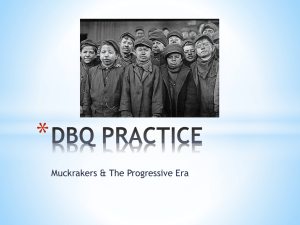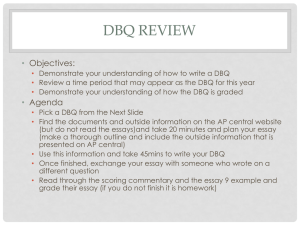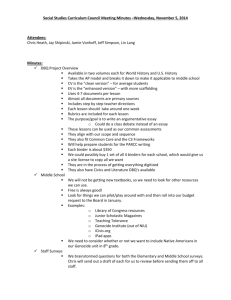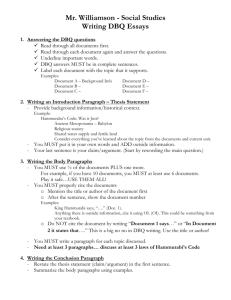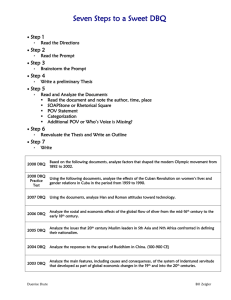ap european history - St. Joseph School District / Homepage
advertisement
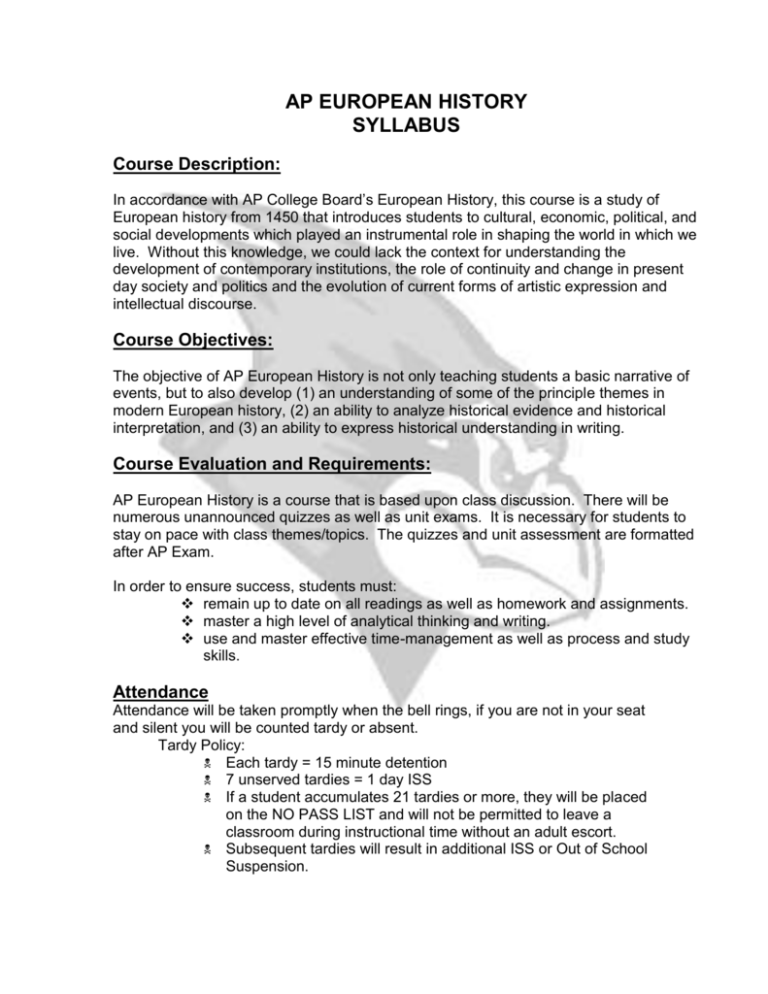
AP EUROPEAN HISTORY SYLLABUS Course Description: In accordance with AP College Board’s European History, this course is a study of European history from 1450 that introduces students to cultural, economic, political, and social developments which played an instrumental role in shaping the world in which we live. Without this knowledge, we could lack the context for understanding the development of contemporary institutions, the role of continuity and change in present day society and politics and the evolution of current forms of artistic expression and intellectual discourse. Course Objectives: The objective of AP European History is not only teaching students a basic narrative of events, but to also develop (1) an understanding of some of the principle themes in modern European history, (2) an ability to analyze historical evidence and historical interpretation, and (3) an ability to express historical understanding in writing. Course Evaluation and Requirements: AP European History is a course that is based upon class discussion. There will be numerous unannounced quizzes as well as unit exams. It is necessary for students to stay on pace with class themes/topics. The quizzes and unit assessment are formatted after AP Exam. In order to ensure success, students must: remain up to date on all readings as well as homework and assignments. master a high level of analytical thinking and writing. use and master effective time-management as well as process and study skills. Attendance Attendance will be taken promptly when the bell rings, if you are not in your seat and silent you will be counted tardy or absent. Tardy Policy: Each tardy = 15 minute detention 7 unserved tardies = 1 day ISS If a student accumulates 21 tardies or more, they will be placed on the NO PASS LIST and will not be permitted to leave a classroom during instructional time without an adult escort. Subsequent tardies will result in additional ISS or Out of School Suspension. Four Guiding Ideas: Take pride in yourself and BHS! Treat persons and property with respect! Serve Others! Be your best and learn from your mistakes! Classroom Procedure: 1. 2. 3. Respect, Respect, Respect: Respect your teacher, respect those around you, and respect the property of Benton High School, and the St. Joseph School District. Students will only be allowed to leave for restroom breaks, or to go to their lockers towards the end of class, if even then. So don’t ask to leave! Issues: Occasionally discipline issues may arise during the class period. Here is the ladder of consequences. 1st – warning regarding the issue 2nd – consequence as necessary depending on the issue – detention, office referral etc. Individual Work Expectations Students are required to sit at their own seats and work INDEPENDENTLY to accomplish the learning goal. This may mean that you are reading, writing, researching (different mediums) or focusing on the task. The main-focus is that you are working QUIETLY and at your own workstation. Partner/Group/Team Work Expectations Have a positive attitude Be willing to learn and work. Each person gives 100% best effort Each person is responsible for his or her specific job. Communicate only with the people you are working with. EVERYONE STAY FOCUSED AND ON TASK! CONTACT INFORMATION: Times Mr. Nash is available in the following locations: Classroom A115, or my office in A115. 7:15 – 7:35 a.m. – everyday 1:15 – 3:00 p.m. – everyday -- Or by appointment Mr. Nash can be reached by Phone – 816.671.4030 Email – robert.nash@sjsd.k12.mo.us -- rbobnash3@gmail.com Text: o The Making of the West: Peoples and Cultures Hunt, L., Martin, T., Rosenwein, B., & Hsia, R. (2005). The making of the west: Peoples and cultures. Boston, MA: Bedford/St. Martins. Supplemental Resources: o o o Sources of The Making of the West: Peoples and Cultures: Volume 1 Lualdi, Katharine J. (2005). Sources of the making of the west: Peoples and cultures: Volume 1. Boston, MA: Bedford/St. Martin. Sources of The Making of the West: Peoples and Cultures: Volume 2 Lualdi, Katharine J. (2005). Sources of the making of the west: Peoples and cultures: Volume 2. Boston, MA: Bedford/St. Martin. The Making of the West: Preparation Guide for the AP* European History Exam Johnson, E., & Thompson, V. (2005). The making of the west: Preparation guide.Boston, MA: Bedford/St. Martins. Online Resources: o Class website: o Text website: http://bcs.bedfordstmartins.com/hunt/default.asp?s=&n=&i=&v=&o=& ns=0&uid=0&rau=0 o Gmail: https://www.google.com/a/students.sjsd.k12.mo.us/ServiceLogin?ser vice=CPanel&passive=1209600&continue=https://www.google.com/a /cpanel/students.sjsd.k12.mo.us/UserHub&followup=https://www.goo gle.com/a/cpanel/students.sjsd.k12.mo.us/UserHub o COURSE OUTLINE INTRODUCTION AND THE LATER MIDDLE AGES POLITICS FROM 1815 TO 1848 AND NINETEENTH CENTURY SOCIETY THE RENAISSANCE THE INDUSTRIAL REVOLUTION, URBANIZATION THE REFORMATION AND RELIGIOUS WARS THE AGE OF ABSOLUTISM AND CONSTITUTIONALISM THE EIGHTEENTH CENTURY THE FRENCH REVOLUTION AND NAPOLEONIC ERA UNIFICATION, THE AGE OF MASS POLITICS WORLD WAR I AND THE INTERWAR PERIOD THE RISE OF DICTATORSHIPS AND WORLD WAR II 1945 TO THE PRESENT AP European History INTRODUCTION AND THE LATER MIDDLE AGES THE RENAISSANCE Unit Objective -- Analyze and critique why modern western civilization’s cultural achievements are grounded in the European Renaissance. THEME/TOPIC STUDENT PREPARATION BEFORE CLASS Read text 505-509 Widening Intellectual Horizons DBQ/RESOURCES TO AID CLASS DISCUSSION Giovanni Rucella and Leonard Bruni, Florence in the Quattrocentro 1427 and 1457) – questions 1-4 Giovanni Pico della Mirandola, Oration on the Dignity of Man (1496) – questions 1-4 Visual Activity: Gentile Bellini, Sacred and Social Body p 505 THEME/TOPIC Revolution in the Arts STUDENT PREPARATION BEFORE CLASS Read text 510-516 DBQ/RESOURCES TO AID CLASS DISCUSSION Renaissance Art Slide Show Document Based Question Process Skills: Given practice and opportunity improved skills of analyzing documents, writing analytical, persuasive essays, and applying critical thinking. Emphasis: How to analyze a primary source document using the FACT method F = facts (date, source, terms(people/concepts/events) and main idea of document. A = add terms to the document that support or oppose the main idea. C = connect how the added terms are evidence to support or oppose the main idea T = tell how the document is evidence to support a position DBQ topic – The Spirit of Humanism DBQ topic – The Renaissance in Art ASSESSMENTS Early Renaissance Quiz THEME/TOPIC STUDENT PREPARATION BEFORE CLASS The Intersection of Private and Public Lives Read text 517-520 DBQ/RESOURCES TO AID CLASS DISCUSSION Alessandra, Letters from a Widow and Matriarch of a Great Family (1450-1465) – questions 1-5 Bernadino of Siena, An Italian Preacher: Sins against Nature (1380-1444) A Merchant’s Advice to his Sons p 519 THEME/TOPIC STUDENT PREPARATION BEFORE CLASS The Renaissance State and the Art of Politics Read text 521-525 THEME/TOPIC STUDENT PREPARATION BEFORE CLASS On the Threshold of World History: Widening Geographic Horizons Read text 531-539 DBQ/RESOURCES TO AID CLASS DISCUSSION Machiavelli, The Prince DBQ/RESOURCES TO AID CLASS DISCUSSION Gomes Eanes de Zurara, Chronicle of the Discovery of Guinea (c. 1453) questions 14 and comparative questions 1-5 Map Activity: Early Voyages of World Exploration, p. 537 Portuguese Voyages of Discovery pp 534-536 Document Based Question Process Skills: Given practice and opportunity improved skills of analyzing documents, writing analytical, persuasive essays, and applying critical thinking. DBQ topic – The Interconnected Globe THEME/TOPIC STUDENT PREPARATION BEFORE CLASS A Clash of Worldviews Read Text 610-617 DBQ/RESOURCES TO AID CLASS DISCUSSION Galileo Writes to Kepler about Their Common Interests in Astronomy Document Based Question Process Skills: Given practice and opportunity improved skills of analyzing documents, writing analytical, persuasive essays, and applying critical thinking. DBQ topic – Science and the Universe ASSESSMENTS RENAISSANCE UNIT TEST AND Free Response Questions (FRQ): Choose three of the following Process Skills: Given practice and opportunity improved skills of analyzing documents, writing analytical, persuasive essays, and applying critical thinking. Prior to writing this first unit’s FRQs, students will receive instruction how to write a thesis statement, how to code questions and practice writing a thesis FRQs to choose from: The Renaissance witnessed a profound change in man’s attitudes from the medieval to a more modern way of thinking. Describe and compare man’s changing views toward life on earth, learning, and art. Why was economic prosperity a necessary precondition for the Renaissance? People tend to think of the Renaissance as an Italian phenomenon, but northern Europe also underwent a renaissance. Compare and contrast the Italian Renaissance with the Northern Renaissance. At the outset of the Age of Exploration and Discovery, it was the nations of the Iberian Peninsula, Portugal and Spain, which led the way during this new age. Why? What particular circumstances, advantages, motives, favored these states taking the lead? How did Columbus begin a global exchange? How did government in the English colonies differ from that in French or Spanish colonies? Explain how the phrase “gold, God, and glory” relates to the time of ocean exploration. Describe and analyze why the debate over a helio-centric versus geo-centric solar system was the primary controversy of the Scientific Revolution. THE REFORMATION AND RELIGIOUS WARS Unit Objective: Explain why growth of the humanist spirit lead to a revolution in religious thought which is still seen and felt in the modern world. THEMES/TOPICS 1. A New Heaven and a New Earth 2. Protestant Reformers THEME/TOPIC Reshaping Society through Religion THEME/TOPIC A Struggle for Mastery STUDENT PREPARATION BEFORE CLASS Read text 548-558 STUDENT PREPARATION BEFORE CLASS Read text 559-564 STUDENT PREPARATION BEFORE CLASS Read text 565-572 DBQ/RESOURCES TO AID CLASS DISCUSSION Martin Luther, Letter to Three Nuns at Wittenberg (1524) Questions 1-3 John Calvin, Articles Concerning Predestination and the Necessity of Reforming the Church (c. 1560 and 1543) questions 1-4 DBQ/RESOURCES TO AID CLASS DISCUSSION Argula von Grumbach and John Hooker, Women’s Actions in the Reformation (1520s-1530s) questions 1-4 DBQ/RESOURCES TO AID CLASS DISCUSSION ASSESSMENTS Early Reformation Quiz THEME/TOPIC A Continuing Reformation THEME/TOPIC Religious Conflicts and State Power STUDENT PREPARATION BEFORE CLASS Read text 573-578 STUDENT PREPARATION BEFORE CLASS Read text 582-590 DBQ/RESOURCES TO AID CLASS DISCUSSION St. Ignatius of Loyola, A New Kind of Catholicism (1546, 1549, 1553) questions 1-4 DBQ/RESOURCES TO AID CLASS DISCUSSION Iconoclasm and Reparations during the Reign of Francis I (1515-1547) Henry VI, Edict of Nantes (1598) questions 1-4 Galileo, Letter to the Grand Duchess Christina (1615) questions 1-4 Map Activity: The Empire of Phillip II, r 1556-1598 p 586 Henry VIII, The Act of Supremacy Visual Activity: "Queen Elizabeth I of England" p 589 Document Based Question Process Skills: Given practice and opportunity improved skills of analyzing documents, writing analytical, persuasive essays, and applying critical thinking. DBQ topic – The Spreading Spirit of Protest THEME/TOPIC STUDENT PREPARATION BEFORE CLASS The Thirty Years’ War and the Balance of Power Read text 591-596 DBQ/RESOURCES TO AID CLASS DISCUSSION The Horrors of the Thirty Years' War p 594 Document Based Question Process Skills: Given practice and opportunity improved skills of analyzing documents, writing analytical, persuasive essays, and applying critical thinking. DBQ topic – Church and State After the Reformation ASSESSMENTS Reformation Unit Test AND Free Response Questions (FRQ): Choose three of the following and develop a well-written essay. Process Skills: Given practice and opportunity improved skills of analyzing documents, writing analytical, persuasive essays, and applying critical thinking. FRQs to choose from: Describe and compare the major doctrines of the three prominent groups of the Protestant Reformation – Lutheranism, Calvinism, and Anabaptism. Describe and analyze the impact of the Counter Reformation on European history. List three questions you could ask Pope Paul III that would help determine the stand of the Catholic Church on the ideas of Luther and the Protestant Reformation. Explain why Henry VIII broke with the Roman Catholic Church and what social and religious changes occurred as a result. THE AGE OF ABSOLUTISM AND CONSTITUTIONALISM Unit Objective: Analyze and evaluate the different monarchial forms of government. THEME/TOPIC Louis XIV: Model of Absolutism THEME/TOPIC Absolutism in Central and Eastern Europe STUDENT PREPARATION BEFORE CLASS Read text 621-629 STUDENT PREPARATION BEFORE CLASS Read text 630-635 DBQ/RESOURCES TO AID CLASS DISCUSSION Louis de Rouvroy, Duke of Saint-Simon, Memoirs (16941723) questions 1-4 DBQ/RESOURCES TO AID CLASS DISCUSSION Ludwig Fabritius, The Revolt of Stenka Razin questions 1-3 A True and Exact Relation of the Raising of the Seige of Vienna (1683) Tsar Peter I, Letter to His Son, Alexei (October 11, 1715) Alexei’s Response (October 31, 1715) questions 1-4 ASSESSMENTS Absolutism Quiz THEME/TOPIC Constitutionalism in England and the Dutch Republic STUDENT PREPARATION BEFORE CLASS Read text 636-648 DBQ/RESOURCES TO AID CLASS DISCUSSION British Parliament, The English Bill of Rights (1689) Thomas Hobbes, Leviathan ASSESSMENTS Absolutism and Constitutionalism Test AND Free Response Questions (FRQ): Choose three of the following and develop a well-written essay. Process Skills: Given practice and opportunity improved skills of analyzing documents, writing analytical, persuasive essays, and applying critical thinking. FRQs to choose from: Describe, compare, and analyze the motivation for the Wars of Louis XIV. The Stuarts monarchs have been at least partially accountable for the decline of monarchial power in Great Britain. Describe and analyze the justification for such a position. Assess and analyze the extent to which the English Civil War and Glorious Revolution of 1688 advanced the cause of constitutionalism in England in the 17t h century. 7. How did Peter the Great accomplish his goal of modernizing Russia? THE EIGHTEENTH CENTURY Unit Objective: Identify and evaluate the impact the world economic system had on European society and culture. Unit Objective: Investigate and critique how Enlightenment philosophers and their ideas that challenged absolute monarchies influenced modern democratic features. THEME/TOPIC The Atlantic System and the World Economy STUDENT PREPARATION BEFORE CLASS Read text 667-675 DBQ/RESOURCES TO AID CLASS DISCUSSION Map of Guaxtepec, Mexico (c. 1580) questions 1-4 David Pieterzen DeVries, Voyages from Holland to America (1655) questions 1-3 Oral History and the Life of the Slave pp 672-673 Map Activity: European Trade Patterns c. 1740 p 668 THEME/TOPIC The Search for Order in Elite and Popular Culture THEME/TOPIC New Social and Cultural Patterns STUDENT PREPARATION BEFORE CLASS Read text 649-660 STUDENT PREPARATION BEFORE CLASS Read text 676-682 THEME/TOPIC STUDENT PREPARATION BEFORE CLASS Consolidation of the European State System Read text 683-692 DBQ/RESOURCES TO AID CLASS DISCUSSION Madame de Lafayette, The Princess of Cleves (1678) questions 1-4 DBQ/RESOURCES TO AID CLASS DISCUSSION Image Analysis: Rosalba Carriera, African p 676 DBQ/RESOURCES TO AID CLASS DISCUSSION ASSESSMENTS World Economy, Society and Culture Quiz THEME/TOPIC STUDENT PREPARATION BEFORE CLASS The Birth of the Enlightenment Read Text 695-701 DBQ/RESOURCES TO AID CLASS DISCUSSION Montesquieu, Persian Letters: Letter 37 (1721) questions 1-3 John Locke, The Second Treatise on Government Montesquieu, Spirit of Laws Jean Jacques Rousseau, The Social Contract THEME/TOPIC STUDENT PREPARATION BEFORE CLASS DBQ/RESOURCES TO AID CLASS DISCUSSION Marie-Therese Geoffrin and M. d’Alembert, The Salon of Madame Geoffrin (1765) Questions 1-3 Jacques-Louis Menetra, Journal of My Life (1764-1802) questions 1-4 The Enlightenment at Its Height Read text 708-721 Adam Smith, An Inquiry into the Nature and Causes of the Wealth of Nations (1776) questions 1-4 Contrasting Views: Women and the Enlightenment pp 714715 THEME/TOPIC STUDENT PREPARATION BEFORE CLASS Society and Culture in an Age of Enlightenment Read text 722-728 DBQ/RESOURCES TO AID CLASS DISCUSSION Mary Astell, Reflections upon Marriage (1706) questions 1-3 Pietist Spiritual Notebook (1705) questions 1-3 Document Based Question Process Skills: Given practice and opportunity improved skills of analyzing documents, writing analytical, persuasive essays, and applying critical thinking. DBQ topic – Philosophers and Kings THEME/TOPIC 1. State Power in an Era of Reform 2. Rebellions Against State Power STUDENT PREPARATION BEFORE CLASS Read text 729-741 DBQ/RESOURCES TO AID CLASS DISCUSSION Frederick II, Political Testament (1752) questions 13 Thomas Jefferson, Letter to Colonel Edward Carrington (1787) questions 1-3 Thomas Jefferson, Declaration of Indpendence (1776) ASSESSMENTS Eighteenth Century Unit Test AND Free Response Questions (FRQ): Choose three of the following and develop a well-written essay. Process Skills: Given practice and opportunity improved skills of analyzing documents, writing analytical, persuasive essays, and applying critical thinking. FRQs to choose from: Why was Locke’s belief that governments exist to serve the people considered a radical idea? How did King George III and his advisers help bring about the American Revolution? Why was the Enlightenment called the Age of Reason? List three Enlightenment ideas that are now identified as American ideals. Assume the role of either a philosopher who supports Enlightenment ideas or a church official who supports the old order. Briefly describe your position on reform for a just society. Explain how John Locke’s political ideas could be used to justify the American Revolution. THE FRENCH REVOLUTION AND NAPOLEONIC ERA Unit Objective: Identify and assess the impact on modern societies which experienced social and political revolutions during the 18th and 19th centuries. THEME/TOPIC STUDENT PREPARATION BEFORE CLASS DBQ/RESOURCES TO AID CLASS DISCUSSION Abbe Sieyes, What is the Third Estate? (1789) questions 1-3 Read text 747-756 Political Cartoon – The People under the Old Regime (1815) The Revolutionary Wave The Third Estate Awakens, page 755 THEME/TOPIC STUDENT PREPARATION BEFORE CLASS From Monarchy to Republic Read text 757-762 DBQ/RESOURCES TO AID CLASS DISCUSSION National Assembly, The Declaration of the Rights of Man and of the Citizen (1789) questions 1-3 Olympe de Gouges, Letters on the Trial (1793) questions 1-4 The Rights of Minorities, pp 758 THEME/TOPIC Terror and Resistance STUDENT PREPARATION BEFORE CLASS Read text 763-769 DBQ/RESOURCES TO AID CLASS DISCUSSION Document Based Question Process Skills: Given practice and opportunity improved skills of analyzing documents, writing analytical, persuasive essays, and applying critical thinking. DBQ topic – The Terror and Reaction THEME/TOPIC Revolution on the March STUDENT PREPARATION BEFORE CLASS Read text770-782 DBQ/RESOURCES TO AID CLASS DISCUSSION Map Reading French Expansion, page 771 Contrasting Views: Consequences of the French Revolution pp. 774-776 Society of the Friends of Blacks, Address to the National Assembly in Favor of the Abolition of the Slave Trade (February 5, 1790) p 778 ASSESSMENTS French Revolution Quiz THEME/TOPIC STUDENT PREPARATION BEFORE CLASS 1. The Rise of Napoleon 2. Napoleon’s Authoritarian State DBQ/RESOURCES TO AID CLASS DISCUSSION Abd al-Rahman al-Jabarti, Napoleon in Eygpt (1798) questions 1-4 Read text 780-792 Visual Activity: The Coronation of Napoleon and Josephine p 791 Document Based Question Process Skills: Given practice and opportunity improved skills of analyzing documents, writing analytical, persuasive essays, and applying critical thinking. DBQ topic – France under Napoleon THEME/TOPIC Napoleon’s Conquests and Defeat STUDENT PREPARATION BEFORE CLASS Read text 795-804 DBQ/RESOURCES TO AID CLASS DISCUSSION T.B. Macaulay, Speech on Parliamentary Reform (1831) questions 1-4 An Ordinary Soldier on Campaign with Napoleon, p 804 Contrasting Views: Napoleon For and Against pp 796-797 THEME/TOPIC The Restoration of Europe STUDENT PREPARATION BEFORE CLASS Read text 805-809 DBQ/RESOURCES TO AID CLASS DISCUSSION Map Activity: Europe after the Congress of Vienna, 1815 p 807 ASSESSMENTS French Revolution and Napoleon Unit Test AND Free Response Questions (FRQ): Choose three of the following and develop a well-written essay. Process Skills: Given practice and opportunity improved skills of analyzing documents, writing analytical, persuasive essays, and applying critical thinking. FRQs to choose from: In what ways was the Declaration of the Rights of Man and the Citizen similar to the Declaration of Independence? Do you think Napoleon did more to help or hurt the causes of the French Revolution? Use examples of his actions to support your answer. 3. How did the Reign of Terror contradict the ideals of the French Revolution as formulated in the Declaration of the Rights of Man and the Citizen? 4. Why is it possible to say that the “new order” established in Europe by the Congress of Vienna after Napoleon’s defeat was actually an “old order”? 5. What do you think would be a likely consequence of the Congress of Vienna’s decision to redraw Europe’s boundaries without any concern for national cultures? POLITICS FROM 1815 TO 1848 AND NINETEENTH CENTURY SOCIETY Unit Objective: Evaluate how challenges to the conservative order and new ideologies helped to foster new revolutions in the mid1800s. THEME/TOPIC Political Challenges to the Conservative Order THEME/TOPIC 1. New Ideologies and Romanticism 2. The Ferment of Ideologies THEME/TOPIC The Revolutions of 1848 STUDENT PREPARATION BEFORE CLASS Read text 819-822 DBQ/RESOURCES TO AID CLASS DISCUSSION Map Activity: Revolutionary Movements in the 1820s STUDENT PREPARATION BEFORE CLASS DBQ/RESOURCES TO AID CLASS DISCUSSION 1. Read text 811-818 2. Read text 849-857 STUDENT PREPARATION BEFORE CLASS Read Text 858-868 DBQ/RESOURCES TO AID CLASS DISCUSSION Sandor Petofi, “National Song” of Hungary (1848) ASSESSMENTS Politics From 1815 to 1848 and Nineteenth Century Society Unit Test AND Free Response Questions (FRQ): Choose three of the following and develop a well-written essay. Process Skills: Given practice and opportunity improved skills of analyzing documents, writing analytical, persuasive essays, and applying critical thinking. FRQs to choose from: 6. How did opposing ideologies affect conditions in Europe after 1815? 8. How did differences between conservative and liberal goals lead to conflict in Europe? 9. Were the revolutions of 1830 and 1848 a victory for conservatives or liberals? Why? 10. Describe the positive and negative effects of nationalism in Europe after 1815. THE INDUSTRIAL REVOLUTION, URBANIZATION Unit objective: Assess how and why today’s societies, economies, ideologies, and technologies are impacted by the Industrial Revolution. Unit objective: Consider the factors and then critique why underdeveloped and developing areas of the modern world are affected by the policies of Imperialism. THEME/TOPIC STUDENT PREPARATION BEFORE CLASS Industrial and Urban Growth in Britain Read text 810 - 811 THEME/TOPIC STUDENT PREPARATION BEFORE CLASS The Advance of Industrialization and Urban Growth Read text 829-839 DBQ/RESOURCES TO AID CLASS DISCUSSION DBQ/RESOURCES TO AID CLASS DISCUSSION Factory Rules in Berlin (1844) Ernest Edwin Williams, Made in Germany (1896) Document Based Question Process Skills: Given practice and opportunity improved skills of analyzing documents, writing analytical, persuasive essays, and applying critical thinking. DBQ topic – Progress and Wealth vs. Squalor and Unrest ASSESSMENTS Industrialization Quiz THEME/TOPIC Reforming the Social Order STUDENT PREPARATION BEFORE CLASS Read text 840-848 DBQ/RESOURCES TO AID CLASS DISCUSSION Friedrich Engels, Draft of a Communist Confession of Faith (1847) Margaret Bondfield, A Life’s Work (1948) Emmeline Pankhurst, Speech from the Dock (1908) THEME/TOPIC The Advance of Industry STUDENT PREPARATION BEFORE CLASS Read Text 915-923 DBQ/RESOURCES TO AID CLASS DISCUSSION THEME/TOPIC STUDENT PREPARATION BEFORE CLASS The Transformation of Culture and Society Read text 933-942 THEME/TOPIC Private Life in the Modern Age THEME/TOPIC Modernity and the Revolt of Ideas THEME/TOPIC Growing Tensions in Mass Politics DBQ/RESOURCES TO AID CLASS DISCUSSION Sarah Stickney Ellis, Characteristics of the Women of England (1839) STUDENT PREPARATION BEFORE CLASS Read text 959-969 DBQ/RESOURCES TO AID CLASS DISCUSSION STUDENT PREPARATION BEFORE CLASS DBQ/RESOURCES TO AID CLASS DISCUSSION Read text 970-974 STUDENT PREPARATION BEFORE CLASS DBQ/RESOURCES TO AID CLASS DISCUSSION Read text 975-984 ASSESSMENTS Industrialization and Urbanization Unit Test AND Free Response Questions (FRQ): Choose three of the following and develop a well-written essay. Process Skills: Given practice and opportunity improved skills of analyzing documents, writing analytical, persuasive essays, and applying critical thinking. FRQs to choose from: How did Britain’s agricultural revolution help it industrialize early? 7. Do you think the material benefits of industrialization outweighed the suffering it caused? Defend your position with examples from the text. 8. What do you think were two of the hardest adjustments that a person who gave up farming to move to a city and work in a factory during the Industrial Revolution had to make? 9. How was Karl Marx’s Communist Manifesto a reflection of the times he lived in? 10. Do you think that industrialization has improved the quality of life for most people today? Explain. 11. Taking into consideration the theories of thinkers like Jeremy Bentham, John Stuart Mill, and Karl Marx and reformers like Robert Owen, imagine a scenario that would have allowed Britain to industrialize in a more humane fashion than happened. Describe it briefly. UNIFICATION, THE AGE OF MASS POLITICS, AND IMPERIALISM Unit Objective: Investigate and explain how essential ideas of nationalism helped to form modern western nations. Unit Objective: Formulate how the Age of Mass Politics played a part in the development of modern nations. THEME/TOPIC The End of the Concert of Europe THEME/TOPIC War and Nation Building THEME/TOPIC 1. Establishing Social Order 2. The Culture of Social Order STUDENT PREPARATION BEFORE CLASS DBQ/RESOURCES TO AID CLASS DISCUSSION Read text 873-880 STUDENT PREPARATION BEFORE CLASS 881-890 STUDENT PREPARATION BEFORE CLASS Read text 891-905 DBQ/RESOURCES TO AID CLASS DISCUSSION Rudolf von Ihering, Two Letters (1866) DBQ/RESOURCES TO AID CLASS DISCUSSION Peter Kropotkin, Memoirs of a Revolutionist (1899) Charles Darwin, The Descent of Man (1871) Friedrich Nietzsche, The Gay Science (1882) THEME/TOPIC STUDENT PREPARATION BEFORE CLASS Contesting the Growing Power of the Nation-State Read text 906-910 RESOURCES TO AID CLASS DISCUSSION ASSESSMENTS Quiz THEME/TOPIC The Birth of Mass Politics THEME/TOPIC New Imperialism STUDENT PREPARATION BEFORE CLASS 945-954 DBQ/RESOURCES TO AID CLASS DISCUSSION STUDENT PREPARATION BEFORE CLASS DBQ/RESOURCES TO AID CLASS DISCUSSION Joseph Rudyard Kipling, The White Man’s Burden (1899) Read text 924-932 Jules Ferry, Speech before the French National Assembly (1883) Krupa Sattianadan, Saguna: A Story of Native Christian Life (1887-1888) Map Activity: Africa, c. 1890 (p. 926) Document Based Question Process Skills: Given practice and opportunity improved skills of analyzing documents, writing analytical, persuasive essays, and applying critical thinking. DBQ topic – The British in Asia and Africa THEME/TOPIC European Imperialism Contested STUDENT PREPARATION BEFORE CLASS DBQ/RESOURCES TO AID CLASS DISCUSSION Read text 985-991 ASSESSMENTS Unification, The Age of Mass Politics, and Imperialism Unit Test AND Free Response Questions (FRQ): Choose three of the following and develop a well-written essay. Process Skills: Given practice and opportunity improved skills of analyzing documents, writing analytical, persuasive essays, and applying critical thinking. FRQs to choose from: How did early German nationalism help smooth the transition to a single German state? 3. Compare the role of Cavour and Bismarck in the unification of their countries. 4. What alternative policy could the British have adopted toward Ireland in the 1800s? 5. Why do you think Queen Victoria opposed the women’s suffrage movement? 6. How do you think the size of the Ottoman empire contributed to its decline? 7. Do you think British rule was a blessing or a curse for India? Support your answer with examples. WORLD WAR I AND THE INTERWAR PERIOD Unit Objective: Analyze and evaluate why some conflicts in the modern world had their roots in the causes, events, and outcome of World War I. THEME/TOPIC STUDENT PREPARATION BEFORE CLASS Roads to War DBQ/RESOURCES TO AID CLASS DISCUSSION Map Activity: Africa in 1914, page 986 Read text 992-998 Visual Activity: The “Foreign Pig” is Put to Death p 991 THEME/TOPIC STUDENT PREPARATION BEFORE CLASS The Great War Read text 1003-1013 DBQ/RESOURCES TO AID CLASS DISCUSSION Fritz Franke and Siegfried Sassoon, Two Soldiers’ Views of the Horrors of War (19141918) L. Doriat, Women on the Home Front (1917) Document Based Question Process Skills: Given practice and opportunity improved skills of analyzing documents, writing analytical, persuasive essays, and applying critical thinking. DBQ topic – Entrenchment and Stalemate ASSESSMENTS World War I quiz THEME/TOPIC STUDENT PREPARATION BEFORE CLASS Protest, Revolution and the War’s End Read text 1014-1019 DBQ/RESOURCES TO AID CLASS DISCUSSION Vladimir Ilich Lenin, Letter to Nikolai Aleksandrovich Rozhkov (january 29, 1919) Outbreak of the Russian Revolution, p 1018 Document Based Question Process Skills: Given practice and opportunity improved skills of analyzing documents, writing analytical, persuasive essays, and applying critical thinking. DBQ topic – The Agony of Total War THEME/TOPIC The Search for Peace in an Era of Revolution STUDENT PREPARATION BEFORE CLASS Read text 1020-1027 DBQ/RESOURCES TO AID CLASS DISCUSSION Woodrow Wilson, Fourteen Points Treaty of Versailles ASSESSMENTS World War I and the Interwar Period Unit Test AND Free Response Questions (FRQ): Choose three of the following and develop a well-written essay. Process Skills: Given practice and opportunity improved skills of analyzing documents, writing analytical, persuasive essays, and applying critical thinking. FRQs to choose from: Do you think Germany was to blame for World War I? Explain why or why not. 9. List three possible negative effects of the terms of the peace reached after World War I. Be specific. 10. How might Germany have prevented World War I? 11. How did the machine gun change the nature of fighting? 12. Based on what you know about the beginnings of World War I, why do you suppose the Allies blamed Germany for the war? 13. Compare World War I to previous wars and explain how technology changed the nature of fighting in World War I. Why do you suppose a major goal of both the Fascists and the Nazis was educating the youth? 15. Choose one postwar writer and one artist and link their work to the spiritual state of humanity after the war. 16. Contrast the role of women in Fascist Italy with that of women in the United States after World War I. THE RISE OF DICTATORSHIPS AND WORLD WAR II Unit Objective: Examine and develop an opinion how the Treaty of Versailles affected the future. THEME/TOPIC A Decade of Recovery THEME/TOPIC Mass Culture and the Rise of Modern Dictators STUDENT PREPARATION BEFORE CLASS Read text 1028-1033 DBQ/RESOURCES TO AID CLASS DISCUSSION STUDENT PREPARATION BEFORE CLASS DBQ/RESOURCES TO AID CLASS DISCUSSION Benito Mussolini, The Doctrine of Fascism (1932) Read text 1034-1046 Adolf Hitler, Mein Kampf (1925) Isidora Dolores Ibarruri Gomez, La Pasionaria’s Farewell Address (November 1, 1938) Document Based Question Process Skills: Given practice and opportunity improved skills of analyzing documents, writing analytical, persuasive essays, and applying critical thinking. DBQ topic – Rise of Dictators THEME/TOPIC The Great Depression THEME/TOPIC Totalitarian Triumph STUDENT PREPARATION BEFORE CLASS Read text 1049-1054 DBQ/RESOURCES TO AID CLASS DISCUSSION STUDENT PREPARATION BEFORE CLASS DBQ/RESOURCES TO AID CLASS DISCUSSION Joseph Goebbels, Nazi Propaganda Pamphlet (1930) Read text 1055-1063 ASSESSMENTS Quiz THEME/TOPIC Democracies on the Defensive THEME/TOPIC The Road to Global War STUDENT PREPARATION BEFORE CLASS Read text 1064-1068 DBQ/RESOURCES TO AID CLASS DISCUSSION STUDENT PREPARATION BEFORE CLASS DBQ/RESOURCES TO AID CLASS DISCUSSION Neville Chamberlain, Speech on the Munich Crisis (1938) Read text 1069-1076 Visual Activity: Nazis on Parade, 1048 Map Activity: The Growth of Nazi Germany, 1933-1939, p. 1076 THEME/TOPIC World War II STUDENT PREPARATION BEFORE CLASS Read text 1077-1091 DBQ/RESOURCES TO AID CLASS DISCUSSION Sam Bankhalter and Hinda Kibort, Memories of the Holocaust (1938-1945) Harry S. Truman, Truman Announces the Dropping of the Atom Bomb on Hiroshima (1945) ASSESSMENTS The Rise of Dictators and World War II Unit Test AND Free Response Questions (FRQ): Choose three of the following and develop a well-written essay. Process Skills: Given practice and opportunity improved skills of analyzing documents, writing analytical, persuasive essays, and applying critical thinking. FRQs to choose from: Why did the western democracies fail to stop Axis aggression in the 1930s? How did democratic governments mobilize their resources for total war? Compare the positive and negative effects of technology in World War II. How did the Allied war effort limit the rights of citizens in democratic countries? What were the causes and effects of the Japanese attack on Pearl Harbor in December 1941? 1945 TO THE PRESENT Unit Objective: Critique the development of current social, economic, and political ideas or policies which were formed by the outcome of World War II. THEME/TOPIC 1. World Politics Transformed 2. Political and Economic Recovery in Europe THEME/TOPIC 1. The Revolution in Technology 2. Postindustrial Society STUDENT PREPARATION BEFORE CLASS Read text 1097-1117 STUDENT PREPARATION BEFORE CLASS Read text 1139-1154 DBQ/RESOURCES TO AID CLASS DISCUSSION The Formation of the Communist Information Bureau (Cominform) (1947) DBQ/RESOURCES TO AID CLASS DISCUSSION National Security Council, Paper Number 68 (1950) ASSESSMENTS Post World War II Quiz THEME/TOPIC 1. Decolonization in a Cold War Climate 2. Cultural Life on the Brink of Nuclear War THEME/TOPIC 1. Protesting Cold War Conditions 2. End of the Cold War STUDENT PREPARATION BEFORE CLASS Read text 1118-1134 DBQ/RESOURCES TO AID CLASS DISCUSSION Ho Chi Minh, Declaration of Independence of the Republic of Vietnam (1945) Simone de Beauvoir, The Second Sex (1949) STUDENT PREPARATION BEFORE CLASS DBQ/RESOURCES TO AID CLASS DISCUSSION Bela Liptak, Birth of MEFESZ (1956) Josef Smrkovsky, What Lies Ahead (February 9, 1968) Read text 1155-1179 Student Voices of Protest (1968) Glasnost and the Soviet Press (1988) THEME/TOPIC STUDENT PREPARATION BEFORE CLASS 1. Soviet Collapses Releases Global Forces 2. Global Challenges Read text 1187-1220 DBQ/RESOURCES TO AID CLASS DISCUSSION U.S. Embassy, Saudi Arabia, Saudi Ban on Oil Shipments to U.S. (October 23, 1973) Zlata Filipovic, A Child’s Life in Sarajevo (October 6, 1991June 29, 1992) and Discontent 3. Global Culture and Society African National Congress, Introductory Statement to the Truth and Reconciliation Commission (August 19, 1996) Document Based Question Process Skills: Given practice and opportunity improved skills of analyzing documents, writing analytical, persuasive essays, and applying critical thinking. DBQ topic – The Rise and Fall of the Soviet Empire ASSESSMENTS 1945 to the Present Unit Test AND Free Response Questions (FRQ): Choose three of the following and develop a well-written essay. Process Skills: Given practice and opportunity improved skills of analyzing documents, writing analytical, persuasive essays, and applying critical thinking. FRQs to choose from: What do you think were the difficulties faced by nations like India who chose to remain nonaligned during the Cold War? If you were the leader of a developing country, what would be your top priority, economic development or protecting the environment? Explain. 10. How have changes in the nature of war made it important for countries to work together to solve their problems? 11. Why do you think leaders of developing nations might be less likely than leaders of western nations to feel that protecting the environment should take priority over economic development? 12. Based on what you know about increasing global interdependence, do you think the world will still be organized into self-governing nation-states a century from now?

